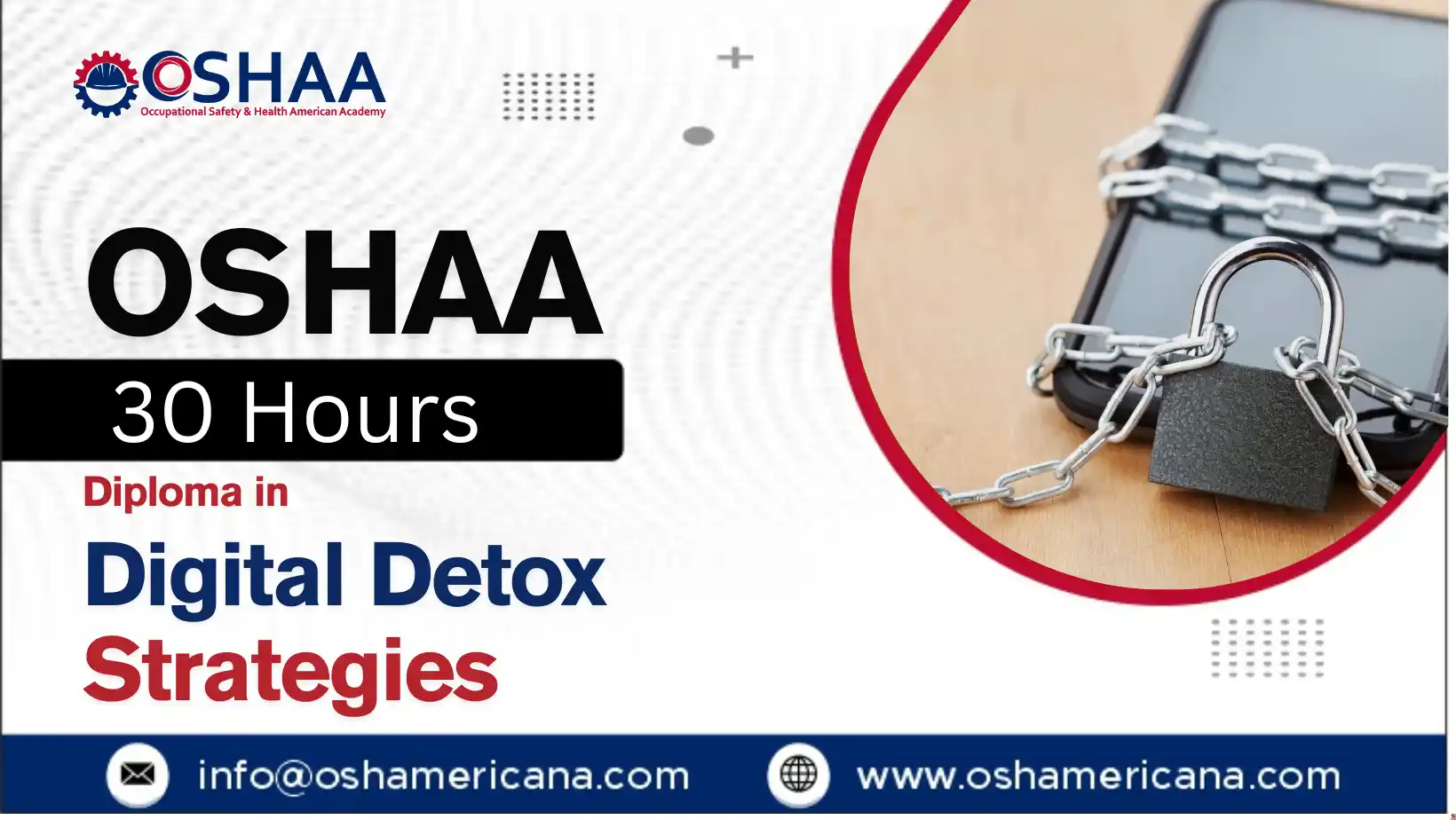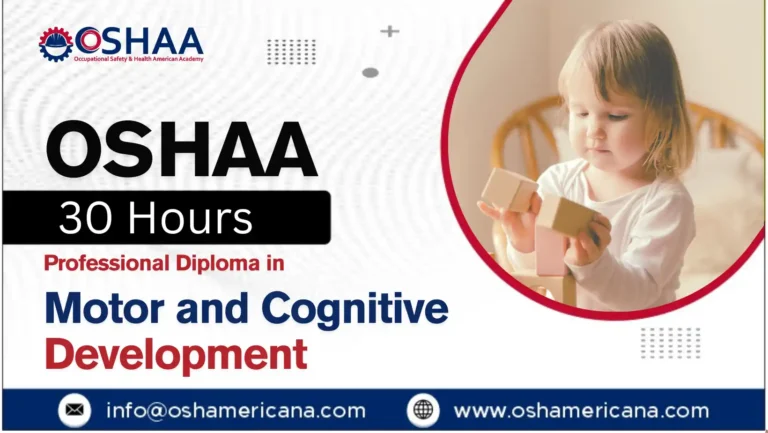Diploma in Digital Detox Strategies – Reclaim Focus and Wellbeing
In an increasingly connected world, constant digital engagement is taking a toll on mental health, productivity, and overall well-being. The OSHAA 30-Hours Diploma in Digital Detox Strategies is designed to help participants understand the psychological and physiological impact of digital overload and learn how to implement practical, sustainable strategies for healthier technology use.
This diploma is ideal for individuals seeking to reclaim balance in their personal or professional lives, as well as professionals aiming to support others in navigating digital stress. With evidence-based guidance and real-world applications, the course empowers participants to assess, manage, and reduce digital dependency while promoting long-term mental and emotional resilience.
Technology plays a central role in modern life, yet excessive screen time, social media use, and information overload have been linked to anxiety, sleep disturbances, and reduced focus. The need for digital detox strategies has never been more urgent. This programme explores the causes, consequences, and solutions for digital fatigue and offers practical tools for building a healthier relationship with technology.
The diploma spans 30 guided learning hours and covers a wide range of topics, including digital habits and mental health, behavioural science, social media dependency, and the design of personalised detox plans. Participants will explore the impact of digital environments on brain function, sleep cycles, attention span, and interpersonal relationships.
OSHAA 30-Hours Diploma in Digital Detox Strategies
Study Units
Learning Outcomes
Introduction to Digital Dependency and Its Societal Impact (3 Hours)
- Understand the concept of digital dependency and its emergence in modern society
- Identify common patterns of excessive technology use across different age groups
- Explore the social, cultural, and psychological drivers of digital overuse
- Recognise the wider societal consequences of digital saturation
Neuroscience of Screen Time and Cognitive Overload (4 Hours)
- Understand how prolonged screen exposure affects brain structure and function
- Examine the impact of multitasking and information overload on memory and attention
- Identify the neurological pathways involved in digital addiction behaviours
- Apply neuroscience principles to promote healthier screen use
Social Media, Dopamine Loops, and Emotional Regulation (5 Hours)
- Explore how social media platforms exploit reward systems to reinforce use
- Understand the role of dopamine and feedback loops in addictive digital behaviour
- Recognise the impact of online interactions on self-esteem, anxiety, and mood
- Develop strategies to support emotional regulation in a digitally connected world
Sleep Disruption, Eye Strain, and Physical Health Effects (5 Hours)
- Understand how screen exposure disrupts circadian rhythms and melatonin production
- Identify the physical symptoms of digital overuse including eye strain and posture issues
- Explore the link between sedentary behaviour and long-term health risks
- Apply practical techniques to reduce physical strain and improve sleep hygiene
Behaviour Change Theory and Digital Habit Formation (3 Hours)
- Learn key behaviour change models relevant to digital detox (e.g. Transtheoretical Model, Habit Loop)
- Identify triggers and reinforcements that sustain digital habits
- Develop goal-setting techniques to support habit reformation
- Understand the psychological stages of behaviour change
Mindfulness and Conscious Technology Use (3 Hours)
- Explore mindfulness principles in the context of digital engagement
- Practise techniques to increase awareness of digital consumption patterns
- Understand the benefits of digital minimalism and intentional screen use
- Integrate mindfulness strategies into daily digital routines
Designing and Implementing Personal Digital Detox Plans (4 Hours)
- Assess personal screen time patterns using digital well-being tools
- Set realistic and measurable detox goals
- Develop a structured plan to reduce non-essential digital use
- Evaluate progress and adjust strategies for long-term effectiveness
Supporting Children and Adolescents in Managing Screen Use (3 Hours)
- Understand developmental considerations related to screen exposure in young people
- Identify risks and challenges faced by children and teens in digital environments
- Explore strategies for guiding healthy digital habits in families and schools
- Promote open communication and modelling of responsible technology use
Course Benefits: OSHAA 30-Hours Diploma in Digital Detox Strategies
- Offers a recognised qualification that supports career development in health, education, HR, coaching, and community outreach settings
- Equips participants with a thorough understanding of digital dependency and its impact on mental, physical, and emotional health
- Enhances awareness of how excessive screen use affects brain function, sleep quality, and overall well-being
- Provides practical tools and techniques to develop and implement effective digital detox strategies
- Builds confidence in creating personalised, sustainable digital wellness plans for individual or group application
- Promotes mindfulness and conscious technology use to improve focus, productivity, and life balance
- Supports participants in recognising and managing digital stress, fatigue, and social media-related anxiety
- Prepares participants to guide and support children, adolescents, and adults in establishing healthy screen habits
- Encourages responsible digital engagement in educational, workplace, and family environments
- Strengthens professional skills in wellness promotion, behaviour change, and digital health education
The OSHAA 30-Hours Diploma in Digital Detox Strategies is designed for participants who wish to better understand the effects of digital overuse and learn how to restore a healthier relationship with technology. It is particularly suitable for:
- Health and wellness professionals supporting individuals experiencing digital stress or burnout
- Educators, school staff, and youth mentors concerned with screen time in children and adolescents
- HR professionals and team leaders promoting digital well-being in the workplace
- Mental health practitioners incorporating digital balance into therapy and self-care strategies
- Parents, carers, and community workers guiding families in managing device use
- Individuals seeking personal development and improved digital habits for better mental clarity and balance
This course is ideal for participants committed to fostering digital awareness, improving everyday focus, and creating a more mindful, balanced life both online and offline.







